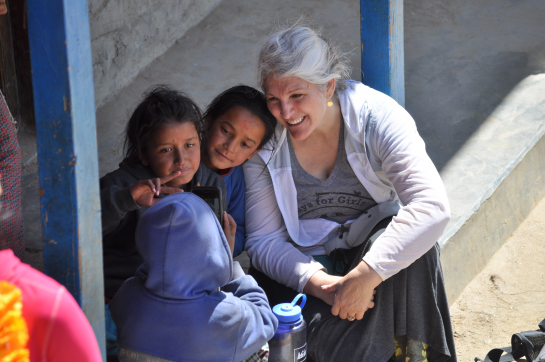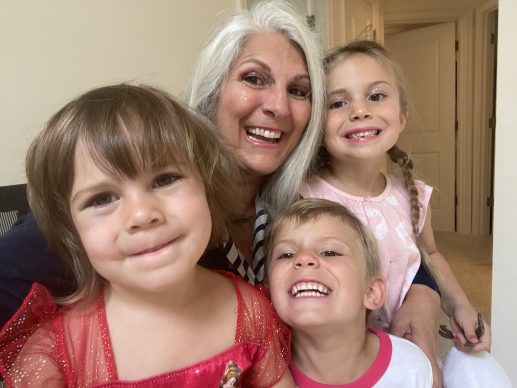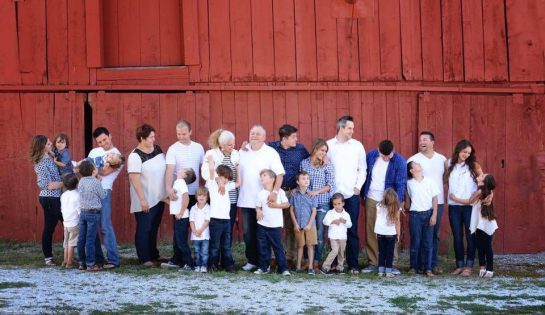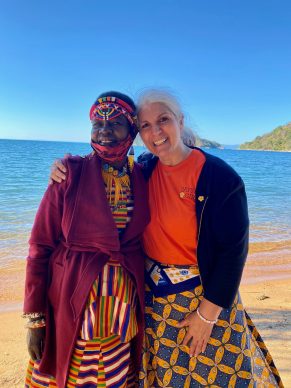Celeste Mergens is the CEO and Founder of Days for Girls International, an award-winning champion for Women’s Health and Menstrual Health Equity. Days for Girls was named by the Huffington Post as a ‘Next Ten’ Organization poised to change the world in the next decade. Now they start global conversations and provide care products for women all over the world so they can go to work and school, and have the confidence to shatter stigma and shame.
Trigger warning: Mention of sexual exploitation.
Tell me about Days for Girls. How did you find and adopt this as a project?
I didn’t find it. It found me. I had been doing sustainable development projects in Kenya and was invited by a dignitary to see a health program in the slums of Kibera in 2008. He also introduced us to a nearby orphanage project that swelled to approximately 1400 kids in the wake of post-election violence that happened in 2007/2008.
Shortly before a return trip to Kenya, I got a phone call explaining that the orphanage was completely out of food and water, and had been for two days. As a woman who experienced hunger as a child, I knew what that felt like and I wanted to help with all my heart. I hit my knees immediately and asked, “What can I do to help the children?” We’d already done everything we could. We had no more resources to share. “Please just tell me what to do. I have nothing left to share, and I’m going to need help.” Nothing came to me. I fell asleep still pleading, and still no answer. I woke up at 2:30 in the morning with the thought, “Have you asked what the girls are doing for feminine hygiene?”
I’d never thought to ask that question! I ran to the computer and emailed to ask, and got an immediate answer. The response was: “Nothing. They wait in their rooms.”
The girls sat on a piece of cardboard for days during their periods. No access to leaving their rooms. No access to school. We were able to raise $200 for disposable feminine hygiene products – pads for the 500 girls who had that need at that time.

Celeste in Nepal
I knew that even if we could raise and send the money each month for pads, if they needed food, they would use the pad money for food. And they should. So how could they have something they could count on month after month? That was when I designed the first Days for Girls pad, on a napkin on the trunk of a car, ironically.
The design went to Relief Societies in our stake, it went to Relief Societies in Utah, there was even a dorm at Utah State University that took it on. There were other churches all over the valley where we live in Washington that participated. Miraculously, we were able to make the first 500 Days for Girls kits – eight huge duffels of supplies.
We used every resource we had, and we were fifty pairs of underwear short. You cannot arrive at an orphanage fifty pairs of underwear short. As we were packing to leave, my friend said, “What are we going to do?” I said, “If I know anything about this project, it’s not our project. God will find a way.” She gave me a skeptical look. We were packing at my husband’s office, and an employee came in: “I was told to bring this box for Celeste.” Inside were fifty pairs of underwear and four little boys shorts – one of his family members had bought them while on vacation and mailed them. From the beginning, it has been that way.
Also, from the beginning, we have provided education. I asked someone, “Who talks to the girls about periods?” No one. I wasn’t a global expert in menstrual wellness and sexual reproductive health – that wasn’t a thing on my list of what to be when I grew up. But it looked like I was going to become one.
I was concerned but knew they needed that, so we prepared a whole presentation. As we did the presentation, they were just so happy to receive the kits. The girls circled around after – I have a photo of them – and they said, “Thank you so much, because before you came, we had to let them use us if we wanted to leave the room and go to class.” I was hoping that didn’t mean what I feared it meant. They explained that they were sexually exploited in exchange for a single disposable pad. In that moment, Days for Girls was born.
I don’t know how you could do anything else.
Exactly! When people ask if I’m the founder of Days for Girls, I say, “Technically?” I’m a really good listener who pays attention, shows up, and keeps working. God is the founder.
The things that I survived in childhood led to the compassion, understanding, and empathy that I need to do this work as present and never condescending. It takes listening and learning, so we can become better at what we’re doing.
We’ve been through thirty-one iterations of our pads. That’s taken humility to ask, what else could work better? Today we hold two patents, because of asking what could work better – that whole ethos that people can create great solutions if you give them a chance. Honoring the wisdom of those we serve is at the core of Days for Girls.
I came home and told people, “This is what happened, this is what they told us.” They said, “Nooo, it’s only that one orphanage, people don’t really need pads, people aren’t out of pads, come on!”
It sounds like they weren’t out of pads, they just never had anything to begin with.
Now we know, of course – what does a homeless woman do? What does a foster girl do? What does anyone do, who has to choose between food and hygiene? But we didn’t know that then. No one was talking about it then – not the World Health Organization, not any nonprofits. It was hidden in the stigma.
So I would just say, “Go ask.” People would come back: “My friend in India says they asked and this is something they need!” The list went on. So we made the resources available, we invited people to join, we made it as easy as possible to do, and we all just started working together.
Today, there have been over 70,000 volunteers in Days for Girls. We’ve reached 144 countries on six continents, more than 2.3 million women and girls, because the Lord loves His daughters.
Going back a little, are you comfortable sharing what you experienced as a child that led you to have this level of compassion?

Celeste with her granddaughters
My family moved a lot – 32 times. As a result of that instability, we’d sometimes go without food and were homeless. It was a very unpredictable place with a lot of shouting and abuse. A stormy season. I had to survive a lot of things, including being abused in almost every way you can be abused.
But I got an incredible gift along the way. This doesn’t sound like a gift, but I was about five years old and we were living at a state park. I was walking on a path, and a woman came into view with her little white dog with a sparkly collar and sparkly leash. Following the sparkle in her hand with my eyes, she threw a half-eaten apple into a dumpster. I was trying to decide if I could get that apple and not get trapped in the dumpster when I realized she was staring at me. She said, “Where are your shoes, girl?” I said, “I’m toughening my feet.” Then it was like a mirror turned around and I could see what she saw – a dirty little girl in this place, barefoot with dirty feet. I could see that, but I had this wave come up inside me – “I am not from here. I am not this place. I am not what you see.” In that moment, I really did get the chance to decide whether to let the impressions of others define me, this place define me, this situation I was in define me, or if I was something else.
I used to think of her as Cruella DeVil, but I’ve realized that for all I know she could have been an angel. She asked with her rude comments for me to decide if I was going to be what she saw. Going forward, I didn’t believe the things that happened to me defined me. That changed everything.
People are not their circumstances – they’re so much more than that! It comes from having survived circumstances that didn’t look very survivable and recognizing that the situation doesn’t define me. How I respond defines me.
I imagine that helped you commit to education and being a member of the Church: “I’m not going to be like this as an adult.”
I read the scriptures when I was eight for the strength that came from them. I needed anchors to hold onto. I wouldn’t be alive if it weren’t for the gospel of Jesus Christ. I am so grateful. Every day I count on the inspiration that comes from praying and studying and knowing about the gift of the Holy Ghost. That’s why I can walk into a meeting with the Minister of Education and the Minister of Health and the First Lady of a country, and know that it’s going to be okay. I don’t have to be perfect. I can be more interested in them than worried about if I will nail it, because I will be guided.
This is another reason I know who holds Days for Girls, which was founded in 2008. I was asked to give a TEDx Talk in 2010, but I had a health challenge – I had a severe seizure that lasted so long they were going to put me on a life flight. For three months, if I blinked, I would fall to the left, so I had to hold onto the wall to walk. I couldn’t read because my eyes wouldn’t work together for about four months. It took me a whole year to be able to carry a tune again because of the damage to my brain.
Days for Girls was happening through this. We had amazing volunteers, but we didn’t have administrative tasks covered yet. Some days, I couldn’t get on the phone because I knew my speech was slurred, and I really couldn’t do anything. One day, I was feeling sorry for myself but I turned on the TV and watched three episodes of “Touched by an Angel” in a row. Two of them had characters in extreme end-of-life medical conditions, trying to prepare for their family’s financial support after they passed away. I thought, “Okay, I get it, I don’t have to support my family. I’m just laying here. I’m surrounded by love. I’m in the lap of luxury. People bring me lunch sometimes. I’m fine!” I realized that if all I ever did with the rest of my life is sit in the garden and hug my grandkids and pray for people…I’ve read thousands of books, I’ve had many adventures…It was enough. In the moment of letting it go, I started doing better. I had a dream that night about something I should do. My symptoms were substantially better within a week and it was remarkable.
I’d just had the seizure when I auditioned for the TEDx Talk. I had to get a ride because I couldn’t drive and I was praying with all my heart I wouldn’t pass out. Not “Help me do well,” just not pass out. The audition was better than the actual presentation. [Celeste’s TEDx talk was in Bellingham, Washington on Nov. 23, 2013.]
Because of that season of weakness, I know with certainty whose legs I’m walking on, whose breath I draw, and whose eyes I’m seeing with. No matter how many awards Days for Girls wins, no matter how many awards I win, it’s just about the girls. So when I spend time with the First Lady and other dignitaries, I see it as a tremendous gift and a true responsibility to represent the girls and represent what’s possible when we all come together.
You said on the first trip, you took $200 of disposable pads. That’s great for one month, but what about the next month? If it’s disposable, you need to get $200 of supplies every single month because they’re being used and thrown away.
Exactly. And guess what happened when we got there. The pit latrines were all stopped up with used pads. They had to hand-shovel them out because there was no place to throw them away. The chain link next to the pit latrines were filled with rolled-up disposed pads. They were piled against fence posts, and there was a big pile at the end of the row of latrines. Some girls had even reached in and grabbed one to rinse and reuse someone else’s pad.
The stigma because of the mess, the shame and health issues, and sanitation issues – single-use is just really not a solution unless they have incinerators. And what about the plastic pieces? Not only that, but how do you get it next month? Sometimes they don’t have any kind of disposable, single-use items in their community.
So Days for Girls makes reusable hygiene products from fabric. The girls who get your kits are not stuck in their rooms, and they are contributing members of their community every day.
Absolutely. And think about confidence. Think of your daughter if she had to go without – if she’s at school and trying to manage toilet tissue or something like socks, just trying to make it work, how confident is she sitting in the classroom taking exams? How confident is she when she’s ready to leave the house for the day? How confident is she that she’s not going to have an accident or a stain?
It’s about dignity and confidence, and how their community relates to them. Not having a product that you need means that you’re isolated. Not having a product that you need means that you’re shamed and mocked. One of the ambassadors for women’s health said from the time she was teenager and had a leak, she’s been called “the girl with the red drops” in her language. She’s an adult with her own children now, and she’s still the girl with the red drops.
You’re giving confidence, opportunity, and shifting a stigma, especially with education, and especially if everyone understands women’s reproductive health. We’ve added a program called Men Who Know, so men get to be part of the conversation. It’s really powerful for everyone to know that without periods, there would be no people. Every one of us is related to menstruation, not just the women. Everyone. We’re making sure everyone knows it’s a big deal, and it relates to all of us.
What does global sustainable development mean? How does helping girls in an orphanage have menstruation supplies factor in?

Celeste with her family
Sustainable development is finding solutions that help communities facing poverty to help themselves. It considers poverty in a way that is inclusive of the communities and is practical for them to engage with. Thinking of what works for them. You can do a whole lot of harm if you don’t know what you’re doing.
With Days for Girls, that translates to listening about the product design and making the education that goes with it to be relevant. Teams have gone on listening tours – what else do you need, did we skip something, making sure even the illustrations are culturally relevant. The background of sustainable development helped me be keenly aware that our decisions as an organization needed to be thoughtful for the long term. The volunteers making and taking the kits need to be educated, and the communities receiving them need to be educated, be translators, and eventually taught to lead Days for Girls Enterprises. We make sure those two things go together. Sustainable development is not about a one-time solution but something that can be managed long-term.
An example of NOT sustainable development is I once met an organization providing hearing aids. I asked how they maintain the batteries going forward and how they do follow-up visits, checking to adjust the aids. “Oh, we don’t worry about any of that, our donors just want to know that we handed out the hearing aids.” The person who got to hear, and then that’s taken away when the battery runs out – but they don’t know it just needs a battery, and they don’t have access to get a new one. I don’t know about you, but I believe that’s almost worse.
So it’s really important that when initiatives are started, you consider the long-term outcomes, the engagement and buy-in of the community. Not just saying, “Here,” and dropping things off. That’s why the Days for Girls kits, from the beginning, came with education, care, and usage. Initiatives need to be thoughtful of the actual reality of those being served.
How does your work with Days for Girls relate to your faith and relationship with God?
From the beginning, I felt very strongly that Days for Girls is for everyone. We are not about any one religion, country, nation – anything that would divide us. Days for Girls is not religious, which is why people don’t guess that I’m a member of The Church of Jesus Christ of Latter-day Saints. Nor are we anti-religious. We invite everyone to come together to help end the loss, stigma, and shame around menstruation.
But my faith is part of my every day. It’s crucial that I know I’m going to be okay out there, to know that I’ll be guided in what to say and do. Every day. I count on that comfort.
I just got back from Malawi where I saw a remarkable connection between Days for Girls leaders who live there and follow up on the advocacy done with the First Lady, the Minister of Health, the Minister of Gender, the planning commission, and nonprofits – everybody coming together. It was such a gift to be there. Not once but twice, I was too happy to sleep. I have been too excited to sleep, too anxious to sleep, too tired to sleep. That was the first time in my life that I was too happy to sleep. I literally spent an hour or two just praying in gratitude for the gift of being part of this.

Celeste in Malawi with Chief Theresa Kachindamoto
Period poverty is an issue that can change in our lifetime. A lot of things are really hard to change. Menstrual inequity is not one of them. This is something we can change in our lifetime. It can happen. It’s like being part of the suffragettes. We didn’t get to be there when women got the right to vote, but we can do this one. You’ve been part of it, and your daughter is part of it, to make history happen.
When I was a young girl, I was mistreated and abused for being a girl. To be part of this shift is heavenly. So I was just sending up thank you’s. That is a gift of my faith. I wasn’t restless, I was just grateful.
I find it amazing that if you pay attention and trust, that even closed doors, even the worst things you can imagine, can in the hands of the Lord become truly, incredibly marvelous. The plan I had for my life wasn’t nearly as cool as the plan the Lord had. I was going to be an engineer but the plan was so much bigger than that. And the girl who once didn’t have a home now has three filled passports of places in the world that are second homes to me. It’s incredible.
What is your goal for Days for Girls for 2022, and how can people contribute and help meet that goal?
In 2022, we hope to reach more than 400,000 more individuals around the world. That number includes girls who can stay in school knowing they have what they need, refugees, women who can be productive and more confident, thanks to those that support Days for Girls’ work. You can donate directly, volunteer, and follow us on social media to help reach more!
Is there anything else you’d like to share?
I have a friend who said, “I can’t believe my best friend is a Mormon.” She thought women are mistreated in the Church and not seen as important. I just light up and say, “Nope. That’s not been my experience.”
As women in this world, we have so many gifts and so many strengths. It’s our season to own it. As a woman of faith, and a woman of The Church of Jesus Christ of Latter-day Saints, I feel completely held in that. I am absolutely confident of the possibilities that we all hold to change things.
At A Glance
Name: Celeste Mergens
Age: 59
Location: Mt. Vernon, Washington, USA
Marital History: Married to my best friend of 39 years!
Children: 6 (12 if you count those by marriage) and 16 grandchildren
Occupation: Founder and CEO of Days for Girls International
Convert to the Church: At age 8
Schools Attended: Master’s Degree in Creative Writing and Literature. A second audited in Global Sustainable Development
Languages Spoken At Home: English
Favorite Hymn: I Stand All Amazed
Website or Social Media You Would Like Featured:: http://DaysforGirls.org
Interview Produced By: Trina Caudle
